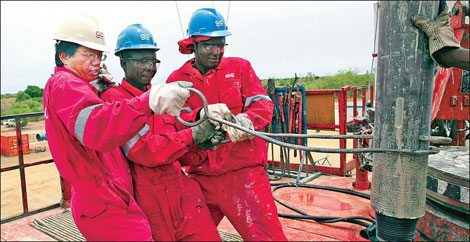-
News >Bizchina
Oil firms may find BP asset race tough
2010-06-30 09:13
Workers at a CNPC project in Chad. Chinese oil firms have been stepping up their overseas expansion pace in recent years. [Provided to China Daily]
Stiff competition from international peers could hamper prospectsBEIJING - Chinese oil companies may find it tough to convert the potential opportunities that may arise when BP Plc decides to divest some of its assets into actual deals, analysts said on Tuesday.
Domestic companies will have to evaluate the deals cautiously if they want to benefit from them, they said.
Cash-rich Chinese oil companies are likely to join the list of potential bidders if BP sells some of its assets to fund the Gulf of Mexico oil spill clean up, said Chen Weidong, chief energy researcher with the energy research institute affiliated to the China National Offshore Oil Corp (Cnooc).
"Domestic companies must study the BP assets carefully," he said.
The valuation of oil and gas assets is affected by many factors, especially the fluctuating crude prices. Domestic oil companies "should make comprehensive asset evaluations" to benefit from the deals, said Chen.
As there are still a lot of uncertainties, oil companies should be well prepared for the difficulties, said Lin Boqiang, director of the China Center for Energy Economics Research at Xiamen University.
"Domestic companies will face stiff competition from foreign peers for the valuable BP assets. It may not be an easy race to win," said Lin.
Although Chinese oil companies have been stepping up their overseas expansion pace in recent years, they still lack the requisite experience and management skills needed for such deals, he said.PetroChina Co, the listed arm of China National Petroleum Corp (CNPC), would have "persuasive" reasons to seek a takeover of BP, Bloomberg said recently, quoting a Standard Chartered Bank report of June 10.
But political opposition in the West would render impossible such a deal, said analysts.
"Don't forget the Unocal case. Chinese oil companies will face similar hurdles in overseas deals," said Lin.
China's largest offshore oil company Cnooc had in 2005 made a bid to acquire US oil company Unocal for $18.5 billion. The company later withdrew the bid after facing political opposition in the US.
Domestic oil companies led by CNPC and Sinopec have quickened their overseas expansion pace in recent years, a move analysts said was necessary to cope with the rising domestic energy demand.
PetroChina said in May it would invest $60 billion to increase its overseas oil and gas output to 200 million tons every year.
PetroChina's overseas oil and gas cooperation areas would be focused on Central Asia, the Middle East, Africa, the Americas, and the Asia-Pacific, Jiang Jiemin, chairman of the company, said in May.
According to analysts, domestic oil companies may be more interested in BP assets in regions like the Middle East, Africa and South America, as they have been making efforts to expand business in these regions.
Related News:
Baidu to hire US engineers to work in China
Japan's industrial production slips 0.1% in May
Emerging market currencies firm up against dollar, yen
Founder Technology plans to raise $167m in rights offer
G-20 responds to European debt crisis with deficit-cutting goal
NDRC orders coal firms to keep prices stable
